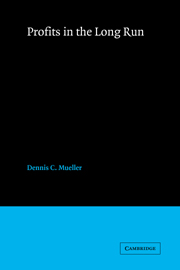Book contents
- Frontmatter
- Contents
- Acknowledgments
- 1 The persistence of firms
- 2 The persistence of profits above the norm
- 3 The persistence of market power
- 4 Profitability and market structure
- 5 The results in perspective
- 6 Profitability and the firm's own advertising, patent activity, risk, and other characteristics
- 7 Profitability and managerial control and compensation
- 8 Mergers and profitability
- 9 Mergers and market share
- 10 The threads gathered and conclusions woven
- Appendix 1 Companies studied
- Appendix 2 Industry categories
- Appendix 3 Industry matchings
- Appendix 4 Assets acquired data (Chapter 7)
- Appendix 5 Mergers and market share: samples of merging companies
- Notes
- References
- Index
2 - The persistence of profits above the norm
Published online by Cambridge University Press: 04 May 2010
- Frontmatter
- Contents
- Acknowledgments
- 1 The persistence of firms
- 2 The persistence of profits above the norm
- 3 The persistence of market power
- 4 Profitability and market structure
- 5 The results in perspective
- 6 Profitability and the firm's own advertising, patent activity, risk, and other characteristics
- 7 Profitability and managerial control and compensation
- 8 Mergers and profitability
- 9 Mergers and market share
- 10 The threads gathered and conclusions woven
- Appendix 1 Companies studied
- Appendix 2 Industry categories
- Appendix 3 Industry matchings
- Appendix 4 Assets acquired data (Chapter 7)
- Appendix 5 Mergers and market share: samples of merging companies
- Notes
- References
- Index
Summary
The hypothesis
As George Stigler (1963, p. 1) once observed, the issue of whether profit rates have a tendency to converge on a single, competitive level is fundamental to a normative evaluation of the competitiveness of a market economy. In an economy subject to uncertainty, profits and losses signal the existence of excess demand or excess supply at longrun competitive price. If resources are free to respond to market signals, they should move into areas where profits are being earned and out of areas suffering losses. This movement of resources continues until returns are equalized across all markets (with appropriate adjustment for risk). Of course, each new period brings new uncertainties and new positions of profits and loss, so that a point in time when all firm or industry profit levels are equal never obtains. But if the market is capable of responding to the signals of profits and losses, the long-run movement of individual firm and industry profit rates should be toward a common competitive level. All observed profits and losses should be short-run deviations around this trend.
Despite the central position that the persistence-of-profits issue must have in any normative evaluation of a market economy, it has received surprisingly little attention from economists. Yale Brozen has addressed the issue tangentially in his attack on the positive concentration–profit rate relationship found in much of the literature. Brozen (1970, 1971a, b) presents evidence that the correlation between concentration and profits is unstable over time.
- Type
- Chapter
- Information
- Profits in the Long Run , pp. 8 - 32Publisher: Cambridge University PressPrint publication year: 1986
- 1
- Cited by



